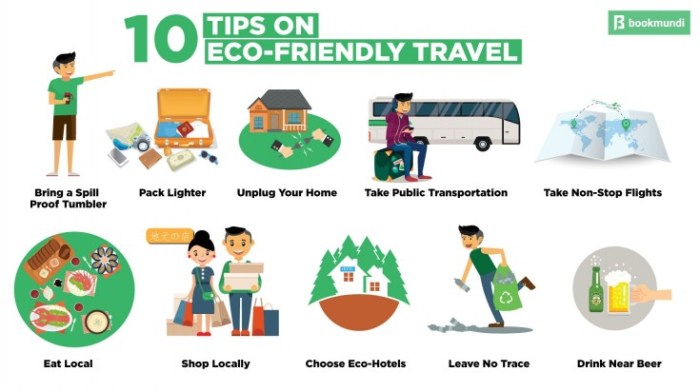Eco-friendly travel tips – Embark on an eco-friendly travel journey with our comprehensive guide to sustainable adventures. Discover practical tips and insights that empower you to minimize your environmental impact while immersing yourself in breathtaking destinations.
From choosing eco-conscious transportation to supporting local communities, this guide equips you with the knowledge and strategies to travel responsibly and make a positive impact on the places you visit.
Sustainable Transportation

Opting for eco-friendly modes of transport, such as trains, buses, or electric vehicles, significantly reduces our carbon footprint. Trains and buses emit fewer greenhouse gases compared to cars, while electric vehicles eliminate tailpipe emissions altogether.
When planning your next family vacation, consider incorporating eco-friendly travel tips to minimize your environmental impact. By choosing sustainable accommodations, reducing waste, and opting for eco-friendly transportation, you can enjoy best family vacation spots while protecting the planet. Remember, even small changes can make a big difference in preserving our natural wonders for future generations.
Public Transport and Ride-Sharing, Eco-friendly travel tips
Utilizing public transportation or ride-sharing services further reduces emissions by maximizing vehicle occupancy. By sharing rides, we decrease the number of vehicles on the road, leading to reduced traffic congestion and air pollution.
Air Travel
When air travel is unavoidable, consider flying direct routes to minimize fuel consumption. Additionally, choose airlines that prioritize fuel efficiency and invest in sustainable practices.
Accommodation Choices

When selecting accommodation during your eco-friendly travels, consider eco-certified hotels and resorts that prioritize sustainability practices. Look for certifications like LEED (Leadership in Energy and Environmental Design) or Green Key, which indicate the property’s commitment to energy efficiency, water conservation, and waste management.
When planning your next adventure, consider incorporating eco-friendly travel tips to minimize your environmental impact. For example, choose destinations that prioritize sustainability or opt for activities that promote local conservation efforts. If you’re an avid diver, explore scuba diving locations known for their marine conservation initiatives.
By supporting responsible tourism practices, you can enjoy unforgettable experiences while contributing to the preservation of our planet’s ecosystems.
Beyond certifications, consider the following factors when evaluating accommodation options:
Energy Efficiency
- Choose accommodations that use energy-efficient appliances, lighting, and heating/cooling systems.
- Look for properties that generate renewable energy sources like solar or wind power.
Water Conservation
- Opt for accommodations that implement water-saving measures such as low-flow showerheads and toilets.
- Consider properties that recycle and reuse water for irrigation or other purposes.
Waste Management
- Select accommodations that have comprehensive waste management programs, including recycling, composting, and reducing single-use plastics.
- Look for properties that support local recycling and composting initiatives.
Supporting Local Communities
Consider staying in guesthouses or homestays that are owned and operated by local communities. This not only reduces environmental impact but also supports local economies and provides an authentic cultural experience.
Responsible Activities and Tours

When planning activities and tours, consider their environmental and social impact. Choose experiences that promote conservation, respect wildlife, and support local communities.
Embracing eco-friendly travel tips can significantly reduce your carbon footprint while exploring the world. These tips can range from choosing sustainable transportation options to packing reusable items. If you’re looking for a budget-friendly family getaway, consider exploring options such as budget family vacations.
By planning your trip wisely, you can enjoy memorable experiences while minimizing your environmental impact and adhering to eco-friendly travel principles.
For wildlife encounters, research ethical tour operators who prioritize animal welfare. Avoid activities that exploit or harm animals. Instead, opt for safaris and wildlife viewing that focuses on conservation and education.
Environmental Impact of Popular Attractions
Popular tourist attractions can have a significant environmental impact. Consider alternative ways to experience these destinations while minimizing your footprint.
- Visit during off-season or less crowded times to reduce pressure on infrastructure and natural resources.
- Use public transportation or walk instead of driving to reduce emissions.
- Choose accommodations and restaurants that prioritize sustainability.
Local Tour Guides
Support local tour guides who prioritize responsible practices. They can provide valuable insights into the local culture, history, and environment.
- Look for guides certified by reputable organizations that promote sustainable tourism.
- Ask about their environmental practices and support for community development.
- Consider hiring local guides who can offer authentic experiences and contribute to the local economy.
Packing and Essentials
Packing for eco-friendly travel requires thoughtful choices and a conscious effort to reduce waste and environmental impact. By planning and packing smart, you can minimize your footprint while still enjoying a comfortable and memorable trip.
Eco-Friendly Packing List
Create a packing list that prioritizes reusable and sustainable items:
- Reusable water bottle: Avoid single-use plastic bottles by bringing your own reusable bottle and refilling it throughout your trip.
- Bamboo toothbrush: Replace plastic toothbrushes with biodegradable bamboo toothbrushes to reduce plastic waste.
- Biodegradable toiletries: Opt for biodegradable shampoos, conditioners, and soaps that won’t harm the environment when disposed of.
- Reusable bags: Bring reusable bags for shopping, laundry, and carrying souvenirs to avoid plastic bags.
- Sustainable clothing: Choose clothing made from organic or recycled materials to support ethical and eco-friendly fashion practices.
Sustainable Packaging Options
Consider the environmental impact of packaging materials and opt for sustainable alternatives:
| Material | Environmental Impact | Sustainable Option |
|---|---|---|
| Plastic | Non-biodegradable, pollutes oceans and landfills | Reusable containers, paper bags |
| Paper | Biodegradable, but can contribute to deforestation | Recycled paper, bamboo paper |
| Bioplastics | Compostable or biodegradable, but may not be widely accepted for recycling | Home composting, industrial composting |
| Metal | Durable, recyclable, but energy-intensive to produce | Reusable containers, recycled metal |
| Glass | Recyclable, but heavy and can break easily | Reusable containers, recycled glass |
Reducing Waste
Minimize waste by packing light, avoiding single-use plastics, and supporting local businesses:
- Pack light: Only bring essential items to reduce baggage weight and minimize the need for disposable items.
- Avoid single-use plastics: Refuse plastic bags, straws, utensils, and other disposable items to reduce plastic waste.
- Support local businesses: Purchase souvenirs and essentials from local businesses to support the community and reduce transportation emissions.
Responsible Dining
Dining out can be an enjoyable way to experience local culture and flavors. However, it is important to consider the environmental impact of your dining choices. Here are some tips for responsible dining:
Eco-Conscious Restaurants
Seek out restaurants that prioritize sustainability in their operations. Look for restaurants that source their ingredients locally, use organic and seasonal produce, and minimize waste. Certifications such as Green Restaurant Association or B Corp can indicate a restaurant’s commitment to environmental practices.
Plant-Based Meals and Sustainable Seafood
Consider choosing plant-based meals or supporting restaurants with sustainable seafood practices. Plant-based diets have a lower environmental impact compared to meat-based diets. Sustainable seafood practices ensure that fish populations are not overexploited and marine ecosystems are protected.
Reducing Food Waste
Food waste is a significant contributor to environmental problems. When dining out, there are several ways to minimize food waste:
- Order only what you can finish.
- Share dishes with friends or family.
- Ask for a to-go box for leftovers.
- Support restaurants that offer composting or food donation programs.
Cultural Immersion and Respect
As travelers, we have a responsibility to respect the local customs and traditions of the places we visit. This means being mindful of our behavior, dressing appropriately, and avoiding actions that could be considered offensive or disrespectful. It also means learning about the destination’s culture and history before you arrive, so that you can better understand the people and their way of life.
Supporting local businesses is another important way to show respect for the local culture. By eating at local restaurants, shopping at local markets, and using local services, you are helping to support the community and preserve its unique character. When interacting with local people, be friendly and respectful, and always ask permission before taking their photo.
Respecting Local Customs and Traditions
- Dress appropriately for the local culture.
- Be mindful of your behavior and avoid actions that could be considered offensive.
- Learn about the destination’s culture and history before you arrive.
Supporting Local Businesses
- Eat at local restaurants.
- Shop at local markets.
- Use local services.
Interacting with Local Communities
- Be friendly and respectful.
- Ask permission before taking someone’s photo.
- Learn a few local phrases.
Last Word: Eco-friendly Travel Tips
As you embark on your eco-friendly travels, remember that every choice you make has the power to shape the future of our planet. By embracing sustainable practices, you not only protect the environment but also contribute to the well-being of local communities and create a lasting legacy for generations to come.
Q&A
What are the benefits of choosing eco-friendly modes of transportation?
Eco-friendly transportation options reduce carbon emissions, conserve energy, and promote cleaner air and water. They also support sustainable infrastructure and local economies.
How can I find eco-certified hotels and resorts?
Look for certifications such as LEED (Leadership in Energy and Environmental Design) or Green Key, which indicate that the establishment meets specific environmental standards.
What should I consider when packing for an eco-friendly trip?
Choose reusable items like water bottles, bamboo toothbrushes, and biodegradable toiletries. Pack light to reduce waste and support local businesses for souvenirs.